Rob Mclennan's Blog, page 66
January 11, 2024
Touch the Donkey : new interviews with Berlatsky, Schelenz, Weaver, Bayrock, Berrigan + Solin,
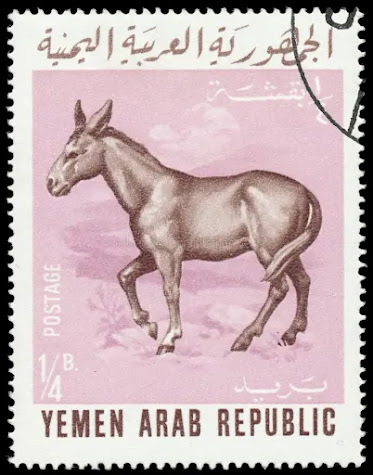 Anticipating the release next week of the fortieth issue of Touch the Donkey [a small poetry journal], why not check out the interviews that have appeared over the past few weeks with contributors to the thirty-ninth issue: Noah Berlatsky, Robyn Schelenz, Andy Weaver, Dessa Bayrock, Anselm Berrigan and Alana Solin.
Anticipating the release next week of the fortieth issue of Touch the Donkey [a small poetry journal], why not check out the interviews that have appeared over the past few weeks with contributors to the thirty-ninth issue: Noah Berlatsky, Robyn Schelenz, Andy Weaver, Dessa Bayrock, Anselm Berrigan and Alana Solin.Interviews with contributors to the first thirty-eight issues (nearly two hundred and fifty interviews to date) remain online, including: Michael Betancourt, Monty Reid, Heather Cadsby, R Kolewe, Samuel Amadon, Meghan Kemp-Gee, Miranda Mellis, kevin mcpherson eckhoff and Kimberley Dyck, Junie Désil, Micah Ballard, Devon Rae, Barbara Tomash, Ben Meyerson, Pam Brown, Shane Kowalski, Kathy Lou Schultz, Hilary Clark, Ted Byrne, Garrett Caples, Brenda Coultas, Sheila Murphy, Chris Turnbull and Elee Kraljii Gardiner, Stuart Ross, Leah Sandals, Tamara Best, Nathan Austin, Jade Wallace, Monica Mody, Barry McKinnon, Katie Naughton, Cecilia Stuart, Benjamin Niespodziany, Jérôme Melançon, Margo LaPierre, Sarah Pinder, Genevieve Kaplan, Maw Shein Win, Carrie Hunter, Lillian Nećakov, Nate Logan, Hugh Thomas, Emily Brandt, David Buuck, Jessi MacEachern, Sue Bracken, Melissa Eleftherion, Valerie Witte, Brandon Brown, Yoyo Comay, Stephen Brockwell, Jack Jung, Amanda Auerbach, IAN MARTIN, Paige Carabello, Emma Tilley, Dana Teen Lomax, Cat Tyc, Michael Turner, Sarah Alcaide-Escue, Colby Clair Stolson, Tom Prime, Bill Carty, Christina Vega-Westhoff, Robert Hogg, Simina Banu, MLA Chernoff, Geoffrey Olsen, Douglas Barbour, Hamish Ballantyne, JoAnna Novak, Allyson Paty, Lisa Fishman, Kate Feld, Isabel Sobral Campos, Jay MillAr, Lisa Samuels, Prathna Lor, George Bowering, natalie hanna, Jill Magi, Amelia Does, Orchid Tierney, katie o’brien, Lily Brown, Tessa Bolsover, émilie kneifel, Hasan Namir, Khashayar Mohammadi, Naomi Cohn, Tom Snarsky, Guy Birchard, Mark Cunningham, Lydia Unsworth, Zane Koss, Nicole Raziya Fong, Ben Robinson, Asher Ghaffar, Clara Daneri, Ava Hofmann, Robert R. Thurman, Alyse Knorr, Denise Newman, Shelly Harder, Franco Cortese, Dale Tracy, Biswamit Dwibedy, Emily Izsak, Aja Couchois Duncan, José Felipe Alvergue, Conyer Clayton, Roxanna Bennett, Julia Drescher, Michael Cavuto, Michael Sikkema, Bronwen Tate, Emilia Nielsen, Hailey Higdon, Trish Salah, Adam Strauss, Katy Lederer, Taryn Hubbard, Michael Boughn, David Dowker, Marie Larson, Lauren Haldeman, Kate Siklosi, robert majzels, Michael Robins, Rae Armantrout, Stephanie Strickland, Ken Hunt, Rob Manery, Ryan Eckes, Stephen Cain, Dani Spinosa, Samuel Ace, Howie Good, Rusty Morrison, Allison Cardon, Jon Boisvert, Laura Theobald, Suzanne Wise, Sean Braune, Dale Smith, Valerie Coulton, Phil Hall, Sarah MacDonell, Janet Kaplan, Kyle Flemmer, Julia Polyck-O’Neill, A.M. O’Malley, Catriona Strang, Anthony Etherin, Claire Lacey, Sacha Archer, Michael e. Casteels, Harold Abramowitz, Cindy Savett, Tessy Ward, Christine Stewart, David James Miller, Jonathan Ball, Cody-Rose Clevidence, mwpm, Andrew McEwan, Brynne Rebele-Henry, Joseph Mosconi, Douglas Barbour and Sheila Murphy, Oliver Cusimano, Sue Landers, Marthe Reed, Colin Smith, Nathaniel G. Moore, David Buuck, Kate Greenstreet, Kate Hargreaves, Shazia Hafiz Ramji, Erín Moure, Sarah Swan, Buck Downs, Kemeny Babineau, Ryan Murphy, Norma Cole, Lea Graham, kevin mcpherson eckhoff, Oana Avasilichioaei, Meredith Quartermain, Amanda Earl, Luke Kennard, Shane Rhodes, Renée Sarojini Saklikar, Sarah Cook, François Turcot, Gregory Betts, Eric Schmaltz, Paul Zits, Laura Sims, Stephen Collis, Mary Kasimor, Billy Mavreas, damian lopes, Pete Smith, Sonnet L’Abbé, Katie L. Price, a rawlings, Suzanne Zelazo, Helen Hajnoczky, Kathryn MacLeod, Shannon Maguire, Sarah Mangold, Amish Trivedi, Lola Lemire Tostevin, Aaron Tucker, Kayla Czaga, Jason Christie, Jennifer Kronovet, Jordan Abel, Deborah Poe, Edward Smallfield, ryan fitzpatrick, Elizabeth Robinson, nathan dueck, Paige Taggart, Christine McNair, Stan Rogal, Jessica Smith, Nikki Sheppy, Kirsten Kaschock, Lise Downe, Lisa Jarnot, Chris Turnbull, Gary Barwin, Susan Briante, derek beaulieu, Megan Kaminski, Roland Prevost, Emily Ursuliak, j/j hastain, Catherine Wagner, Susanne Dyckman, Susan Holbrook, Julie Carr, David Peter Clark, Pearl Pirie, Eric Baus, Pattie McCarthy, Camille Martin and Gil McElroy.
The forthcoming fortieth issue features new writing by: Ryan Eckes, Dennis Cooley, Michael Harman, Terri Witek and Laynie Browne.
And of course, copies of the first thirty-eight issues are still very much available. Why not subscribe? Included, as well, as part of the above/ground press annual subscription! Which you should get right now for 2024!
We even have our own Facebook group. It’s remarkably easy.
January 10, 2024
12 or 20 (second series) questions with Josie Teed
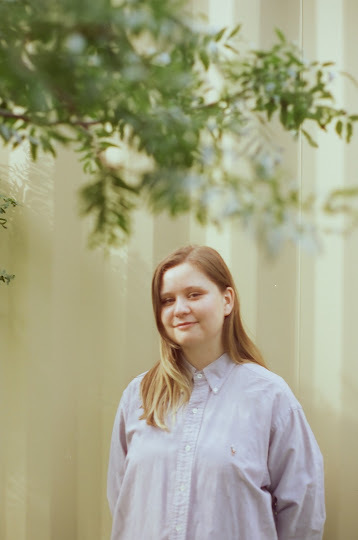 Josie Teed lives in Montreal, Quebec and grew up in the Niagara Region of Ontario. She is currently completing an MA in creative writing at Concordia University. Her first book,
British Columbiana
, was published in March 2023 at Dundurn Press and is available at your favourite bookseller now: https://linktr.ee/britishcolumbiana
Josie Teed lives in Montreal, Quebec and grew up in the Niagara Region of Ontario. She is currently completing an MA in creative writing at Concordia University. Her first book,
British Columbiana
, was published in March 2023 at Dundurn Press and is available at your favourite bookseller now: https://linktr.ee/britishcolumbiana1 - How did your first book change your life? How does your most recent work compare to your previous? How does it feel different?
My first book changed my life in so many ways. It shoved my foot in the door of an industry that many people struggle to break into. It taught me that I am capable of finishing something, of finishing something worth sharing. Most importantly, it showed me that my voice and subjectivity, which I always felt kept me from being close to people, is something that some people can appreciate and even love. That is very special and was genuinely transformative for me.
2 - How did you come to memoir first, as opposed to, say, fiction or poetry?
It wasn’t my decision. My publishers weren’t looking for any fiction when we were in talks about the book. I had been hoping to explore the subject of my memoir from a more fictional perspective, but I’m sort of glad my first book was a memoir because I think it was a more manageable entrypoint for me to write a full-length book for the first time. Now, I have all of this wonderful experience writing about myself and my lived experiences to apply to my new writing, fiction and otherwise.
3 - How long does it take to start any particular writing project? Does your writing initially come quickly, or is it a slow process? Do first drafts appear looking close to their final shape, or does your work come out of copious notes?
I would say it depends, but the beginning of a project is always much easier than the middle and end. Or, rather I give myself more time to work on the beginning, and then the end is a rush and feels like pulling teeth. I would say I revise a lot as I go, so my first draft feels a lot like what I’m hoping the end product will be a lot of the time.
For my current project, I have been thinking about it for I think two years. I have other projects that have been in my back pocket for longer, waiting for me to be ready.
4 - Where does a work of prose usually begin for you? Are you an author of short pieces that end up combining into a larger project, or are you working on a "book" from the very beginning?
I like to start at the beginning (ha ha) and go from there. I usually go in with an intended length, but I’m not a big planner. I am letting my current project go wherever it’s going to go based on what feels best. This may change as I get better at writing and planning.
5 - Are public readings part of or counter to your creative process? Are you the sort of writer who enjoys doing readings?
To be honest, I’ve never done any public readings. In the past I’ve been kind of suspicious of participating in a community of writers or any community at all, because I have trouble in group settings and I feel very susceptible to comparison, competition and what I perceive to be the petty cruelties of cliques. I’m afraid someone will come up to me and tell me they’ve determined exactly how much value I have and what my limitations are as a person and writer, and that I will fall into the box they’ve drawn and it’ll be all over for me.
While I think sometimes people do try to do this, I think it happens less when you get older, and when they do it’s easier to ignore them and do your own thing. Most people are nice, I think. I’d like to let go of this insecurity and one of my goals for 2024 is to participate in a reading.
6 - Do you have any theoretical concerns behind your writing? What kinds of questions are you trying to answer with your work? What do you even think the current questions are?
I think I’m very curious about the gaps between what we know and don’t know about ourselves and the people around us. I still feel mystified by the behavior of other people and myself, and all of the interesting and frustrating things that happen when we bump up against one another. I feel like we’re always torturing each other and asking each other for things, and we rarely know exactly why we do it or why others do it to us.
I think this also extends to bigger divides. For instance, right now I’m really curious about how someone born 100 or 1000 years ago would be similar and different to myself, and how I might show an audience that while also being honest about who they would have been, and telling a story that feels true. Is it actually possible to do that? What concessions will I have to make to do that?
7 – What do you see the current role of the writer being in larger culture? Do they even have one? What do you think the role of the writer should be?
That’s a big question! I think the role of the writer is determined by individual writers and readers, who are looking to do different things in the act of writing and reading, respectively. I think, for me, I want writers to represent an authentic picture of the world as they see it. I won’t agree with each vision but I think it’s important that I get to see it, and that it’s not dishonest (either on purpose or by mistake).
8 - Do you find the process of working with an outside editor difficult or essential (or both)?
I think it can be either! I’ve only had positive experiences with editors thus far, but I have had experiences where unhelpful and unkind feedback has been a setback in my process. Ask me again in five years.
9 - What is the best piece of advice you've heard (not necessarily given to you directly)?
Fawn Parker said in an interview or blog post (I can’t remember where) that she tries not to concern herself with the question of whether her writing is any good or her project has any merit when she’s doing it, and instead takes that as a given. I may be misquoting, but I try to do the same when I’m writing, or doing anything.
In general, though, I think a lot of advice-giving fails because the giver is actually thinking about themselves and their own problems, however well-intentioned. The best advice is solicited (ideally begged for), indirect, or otherwise wisdom that becomes relevant to the receiver years later.
10 - What kind of writing routine do you tend to keep, or do you even have one? How does a typical day (for you) begin?
I’m a big morning writer, and morning person. My cat wakes me up at around 7 for breakfast, and if I’m not already awake I’ll get up and get started as soon as possible if I can. There’s nothing I like better than leaving the house before most of the world is awake, and to watch things come to life slowly. I love to keep the momentum of the morning going. If I let it lag I can be ruined for the day. If my home is quiet or empty I will write there, otherwise I’ll go to the library or a coffee shop. I don’t mind where I write too much, I think when I get too caught up on details that’s when I know I’m not really in a good place concentration-wise and I need to get back to the task at hand. I don’t drink coffee, but I’ll have tea if I’m at a cafe and if I’m at home I’ll sometimes indulge in a morning Diet Coke.
I’d say I usually write for 2-3 hours a session, then I get to have an afternoon knowing I’ve accomplished something, which makes the rest of the day feel so much nicer.
11 - When your writing gets stalled, where do you turn or return for (for lack of a better word) inspiration?
This is another big question! I have to say it really depends on what I am working on, and what is interesting to me at a given time. I always find talking to my siblings, or to my friend Rebecca, very creatively generative.
12 - What fragrance reminds you of home?
Cats!
13 - David W. McFadden once said that books come from books, but are there any other forms that influence your work, whether nature, music, science or visual art?
I’m a big movie watcher, I’m going to the movies twice next week. I also watch a lot of television. That said, I’m not the most visual person. I think I’m of the belief that if you consume narrative media and pay attention, you will become a good storyteller in your chosen medium. I have a private joke with myself that I’ve got my 10,000 hours in watching movies, which makes me an expert on it (it’s not very funny, that’s why it’s a private joke!).
14 - What other writers or writings are important for your work, or simply your life outside of your work?
The Brontes, Elif Batuman, Daphne Du Maurier, Louis Sachar and Alice Munro are all very important to me, each in different ways. Joanna Newsom’s music, too.
15 - What would you like to do that you haven't yet done?
I’d like to fall in love.
16 - If you could pick any other occupation to attempt, what would it be? Or, alternately, what do you think you would have ended up doing had you not been a writer?
I wanted to be a historian, curator or an archaeologist before I started pursuing writing, but I was bad at it. I think I actually just wanted to tell stories about history, and live in it somehow. I didn’t actually have what it takes to do the painstaking work to uncover the nitty gritty of the past that we take for granted, unless it is for narrative ends I think.
17 - What made you write, as opposed to doing something else?
I tried to do a lot of things before I became a writer, even though I think it’s probably the only thing I’m really good at. I think I maybe avoided pursuing writing earlier because I am not the biggest reader in the world. I was also afraid of failure, and I sort of find the pursuit of fame tacky and humiliating, which is unavoidably wrapped up in the desire for success in any creative field. I was so lucky to have a champion in Julie Mannell who thought I was funny, and who thought other people would too, and encouraged me to pursue writing as a career.
18 - What was the last great book you read? What was the last great film?
The last great book I read was Wolf Hall by Hilary Mantel. The last great movie I saw was Ferrari by Michael Mann.
19 - What are you currently working on?
I’m working on a historical fiction novel! Wish me luck!
12 or 20 (second series) questions;
January 9, 2024
two new reviews!
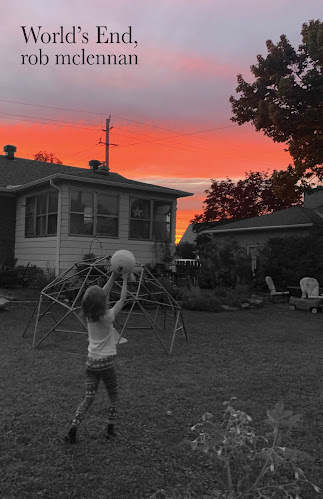 It has been very nice to see two new reviews of my titles pop up lately! Pearl Pirie was good enough to review
World's End,
(ARP Books, 2023)
over at The Miramichi Review
, and
Nick Thran offered this review
of
the book of smaller
(University of Calgary Press, 2022) via Event magazine; thanks so much! And of course, I'm attempting to keep track of all links to my reviews over at my author site, here.
It has been very nice to see two new reviews of my titles pop up lately! Pearl Pirie was good enough to review
World's End,
(ARP Books, 2023)
over at The Miramichi Review
, and
Nick Thran offered this review
of
the book of smaller
(University of Calgary Press, 2022) via Event magazine; thanks so much! And of course, I'm attempting to keep track of all links to my reviews over at my author site, here.January 8, 2024
the VERSeFest fundraiser is live!
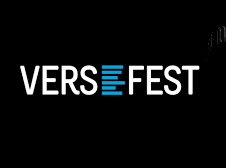 the VERSeFest fundraiser is live!
to officially launch our rebuilding year, check out perks including an in-person poetry workshop with Stephen Brockwell! manuscript consultations with Madeleine Stratford, Otoniya J. Okot Bitek, Sandra Ridley, Stephen Collis, ryan fitzpatrick, Stephanie Bolster and Annick MacAskill! books, chapbooks and magazine subscriptions! and more to come!
the VERSeFest fundraiser is live!
to officially launch our rebuilding year, check out perks including an in-person poetry workshop with Stephen Brockwell! manuscript consultations with Madeleine Stratford, Otoniya J. Okot Bitek, Sandra Ridley, Stephen Collis, ryan fitzpatrick, Stephanie Bolster and Annick MacAskill! books, chapbooks and magazine subscriptions! and more to come!
January 7, 2024
just emerging from losing four days to the flu,
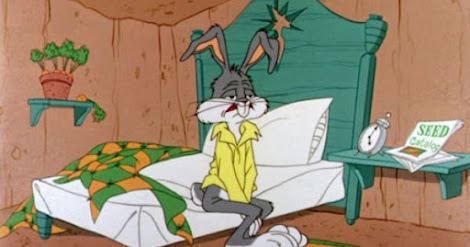 so everything moving a bit slower than I'd prefer. We landed home from family-travel on Wednesday when I went down almost immediately, and I was properly not out of bed again until yesterday. I slept for nearly three full days! At least my fever broke on Friday night. I'm still feeling a bit worn, so if you are expecting anything from me, patience, please.
so everything moving a bit slower than I'd prefer. We landed home from family-travel on Wednesday when I went down almost immediately, and I was properly not out of bed again until yesterday. I slept for nearly three full days! At least my fever broke on Friday night. I'm still feeling a bit worn, so if you are expecting anything from me, patience, please.January 6, 2024
A ‘best of’ list of 2023 Canadian poetry books
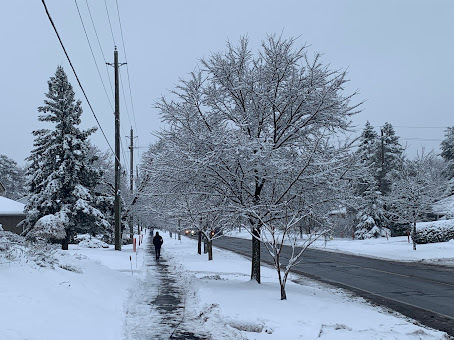 Once more, I offer my annual list of theseemingly-arbitrary “worth repeating” (given ‘best’ is such an inconclusive,imprecise designation), constructed from the list of Canadian poetry titlesI’ve managed to review throughout the past year. This is my thirteenth annual list [see also: 2022, 2021, 2020, 2019, 2018,2017, 2016, 2015, 2014, 2013, 2012, 2011] since dusie-maven Susana Gardneroriginally suggested various dusie-esque poets write up their own versions ofsame, and I thank her both for the ongoing opportunity, and her original prompt.
Once more, I offer my annual list of theseemingly-arbitrary “worth repeating” (given ‘best’ is such an inconclusive,imprecise designation), constructed from the list of Canadian poetry titlesI’ve managed to review throughout the past year. This is my thirteenth annual list [see also: 2022, 2021, 2020, 2019, 2018,2017, 2016, 2015, 2014, 2013, 2012, 2011] since dusie-maven Susana Gardneroriginally suggested various dusie-esque poets write up their own versions ofsame, and I thank her both for the ongoing opportunity, and her original prompt.It does feel as though I’ve done far fewer reviewsthis year than across the prior few, overloaded with a couple of largenon-fiction projects and various other book deadlines, etcetera. There wereplenty of books I simply didn’t manage to get to yet; or are there simply morebooks? There is still a handful of titles from this year I have yet to get to,certainly (including the new Judith Copithorne, which looks brilliant), but unlessI do a count, I haven’t a clue how many reviews I’ve actually managed. The factthat I’ve “only” thirty-eight on this list (compared to other years) suggeststo me that I haven’t reviewed nearly as much this year as I’ve done prior(which I’ve suspected throughout the year, simply busy with other things; andthere are certain Canadian publishers that simply haven’t been sending booksalong, frustratingly), although my count shows I’ve posted some one hundred andforty book reviews across 2023, which is quite a lot. I’m pleased I managed toget a mound of chapbook reviews posted, as well as some journal reviews (somethingI hadn’t been doing nearly as much across the year or two prior), composingreviews of The Capilano Review : 50th Anniversary Issue(s) : 3:46-3:48[see my review here], SOME : sixth issue [see my review here], fillingStation #81 : Some Kind of Dopamine Hit [see my review here] and SOME:seventh issue [see my review here]. There’s also been a plethora of worthy non-fictionprose reviews I’ve posted, with stellar works including INDIGIQUEERNESS:Joshua Whitehead In Dialogue with Angie Abdou (Athabasca University Press,2023) [see my review of such here], Gail Scott, Furniture Music: A Northernin Manhattan: Poets/Politics [2008-2012] (Wave Books, 2023) [see my review of such here] and Jim Johnstone, Write Print Fold and Staple: On Poetry andMicropress in Canada (Gaspereau Press, 2023) [see my review of such here].
Barry McKinnon died this past year, so that was a bitof a hit [see my obituary for him here].
I wonder, occasionally, if I should be working similar‘best of’ lists for chapbooks, or American full-length collections, or fiction,or a geographically-unspecified list of full-length collections, but then I rememberthat this list takes a full day to compile and post, so there you go. And youknow this list always includes a few stragglers from the year prior, yes? I mean,I can only do so much during a calendar year. Beyond that, I always mean forthese lists to be shorter, but I couldn’t think of a list without includingevery book on this list. Is there simply too much exciting work being producedright now?
This year’s list includes full-length poetry titles by Dale Tracy, Khashayar Mohammadi/Saeed Tavanaee Marvi, Manahil Bandukwala, David Dowker, Erin Robinsong, natalie hanna, Jason Purcell, ryan fitzpatrick, Milton Acorn and bill bissett, George Bowering, Dennis Cooley, Jen Currin, Otoniya J. Okot Bitek, Kate Siklosi, Gary Barwin and Lillian Nećakov, Camille Martin, Matthew Hollett, Laila Malik, Emily Osborne, Meghan Kemp-Gee, Weyman Chan, Alycia Pirmohamed, Amy Ching-Yan Lam, Kate Cayley, Jake Byrne, Natalie Rice, Tom Cull, David Martin, Erín Moure, Adam Beardsworth, Jim Johnstone, Amanda Earl, Shane Book, Sandra Ridley, andrea bennett, Nikki Reimer, Ben Meyerson and Matthew Gwathmey.
See this year's full list here.
January 5, 2024
Spotlight series #93 : Emma Rhodes
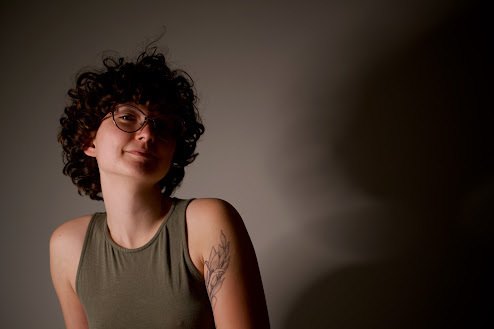 The ninety-third in my monthly "spotlight" series, each featuring a different poet with a short statement and a new poem or two, is now online, featuring Toronto poet and editor Emma Rhodes
.
The ninety-third in my monthly "spotlight" series, each featuring a different poet with a short statement and a new poem or two, is now online, featuring Toronto poet and editor Emma Rhodes
.The first eleven in the series were attached to the Drunken Boat blog, and the series has so far featured poets including Seattle, Washington poet Sarah Mangold, Colborne, Ontario poet Gil McElroy, Vancouver poet Renée Sarojini Saklikar, Ottawa poet Jason Christie, Montreal poet and performer Kaie Kellough, Ottawa poet Amanda Earl, American poet Elizabeth Robinson, American poet Jennifer Kronovet, Ottawa poet Michael Dennis, Vancouver poet Sonnet L’Abbé, Montreal writer Sarah Burgoyne, Fredericton poet Joe Blades, American poet Genève Chao, Northampton MA poet Brittany Billmeyer-Finn, Oji-Cree, Two-Spirit/Indigiqueer from Peguis First Nation (Treaty 1 territory) poet, critic and editor Joshua Whitehead, American expat/Barcelona poet, editor and publisher Edward Smallfield, Kentucky poet Amelia Martens, Ottawa poet Pearl Pirie, Burlington, Ontario poet Sacha Archer, Washington DC poet Buck Downs, Toronto poet Shannon Bramer, Vancouver poet and editor Shazia Hafiz Ramji, Vancouver poet Geoffrey Nilson, Oakland, California poets and editors Rusty Morrison and Jamie Townsend, Ottawa poet and editor Manahil Bandukwala, Toronto poet and editor Dani Spinosa, Kingston writer and editor Trish Salah, Calgary poet, editor and publisher Kyle Flemmer, Vancouver poet Adrienne Gruber, California poet and editor Susanne Dyckman, Brooklyn poet-filmmaker Stephanie Gray, Vernon, BC poet Kerry Gilbert, South Carolina poet and translator Lindsay Turner, Vancouver poet and editor Adèle Barclay, Thorold, Ontario poet Franco Cortese, Ottawa poet Conyer Clayton, Lawrence, Kansas poet Megan Kaminski, Ottawa poet and fiction writer Frances Boyle, Ithica, NY poet, editor and publisher Marty Cain, New York City poet Amanda Deutch, Iranian-born and Toronto-based writer/translator Khashayar Mohammadi, Mendocino County writer, librarian, and a visual artist Melissa Eleftherion, Ottawa poet and editor Sarah MacDonell, Montreal poet Simina Banu, Canadian-born UK-based artist, writer, and practice-led researcher J. R. Carpenter, Toronto poet MLA Chernoff, Boise, Idaho poet and critic Martin Corless-Smith, Canadian poet and fiction writer Erin Emily Ann Vance, Toronto poet, editor and publisher Kate Siklosi, Fredericton poet Matthew Gwathmey, Canadian poet Peter Jaeger, Birmingham, Alabama poet and editor Alina Stefanescu, Waterloo, Ontario poet Chris Banks, Chicago poet and editor Carrie Olivia Adams, Vancouver poet and editor Danielle Lafrance, Toronto-based poet and literary critic Dale Martin Smith, American poet, scholar and book-maker Genevieve Kaplan, Toronto-based poet, editor and critic ryan fitzpatrick, American poet and editor Carleen Tibbetts, British Columbia poet nathan dueck, Tiohtiá:ke-based sick slick, poet/critic em/ilie kneifel, writer, translator and lecturer Mark Tardi, New Mexico poet Kōan Anne Brink, Winnipeg poet, editor and critic Melanie Dennis Unrau, Vancouver poet, editor and critic Stephen Collis, poet and social justice coach Aja Couchois Duncan, Colorado poet Sara Renee Marshall, Toronto writer Bahar Orang, Ottawa writer Matthew Firth, Victoria poet Saba Pakdel, Winnipeg poet Julian Day, Ottawa poet, writer and performer nina jane drystek, Comox BC poet Jamie Sharpe, Canadian visual artist and poet Laura Kerr, Quebec City-area poet and translator Simon Brown, Ottawa poet Jennifer Baker, Rwandese Canadian Brooklyn-based writer Victoria Mbabazi, Nova Scotia-based poet and facilitator Nanci Lee, Irish-American poet Nathanael O'Reilly, Canadian poet Tom Prime, Regina-based poet and translator Jérôme Melançon, New York-based poet Emmalea Russo, Toronto-based poet, editor and critic Eric Schmaltz, San Francisco poet Maw Shein Win, Toronto-based writer, playwright and editor Daniel Sarah Karasik, Ottawa poet and editor Dessa Bayrock, Mahone Bay, Nova Scotia poet Alice Burdick, poet, writer and editor Jade Wallace, San Francisco-based poet Jennifer Hasegawa and California poet Kyla Houbolt.
The whole series can be found online here .
January 4, 2024
today is kate's thirty-third birthday,
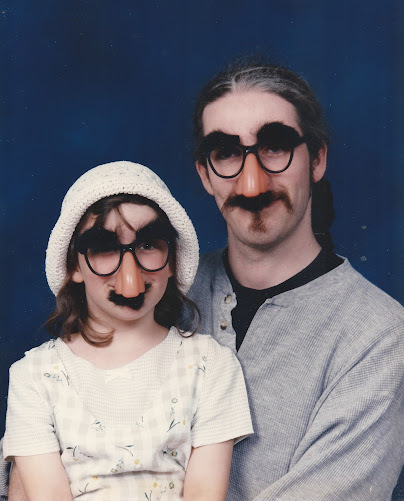 My eldest child turns thirty-three years old today! Happy birthday!
My eldest child turns thirty-three years old today! Happy birthday!Here's a photo we got at the Bay Photo Studio on Rideau Street when she was around seven or so (a photo I have up in my office). I had a coupon for a free 8x10, so thought this would be fun to do as a session. Kate's mother politely declined to participate, and held our coats instead. When my mother heard we were doing photos, she paid for extra copies for herself, although when she finally saw the finished product, she was horrified. I don't think she ever distributed any of her copies.
A few years later, I wanted to do a second session, where Kate and I braid our long hair and dress up as vikings (fur and hats with horns and swords, etcetera), but she responded by immediately getting her hair cut.
January 3, 2024
Jack Underwood, Not Even This: Poetry, Parenthood & Living Uncertainly
An obvious analogy occurs:the similarity between the positioning of your miscellaneous objects, and thebusiness of shifting a poem about on a page. Wait, OK, now I understand exactlywhat you’re doing: that need to go back over and over, resting configurations,rehearsing the through-lines and relations … the muttering and staring intospace, and yes, admittedly, when I’m tired and feel that I cannot convey mypredicament, or the correct formal arrangement does not materialize I, too, knowthat inconsolable frustration … Words have to be right, and in the right orderand position.
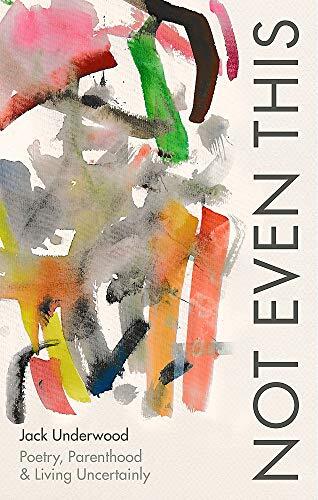 Christinewas good enough to gift a paperback copy of British poet Jack Underwood’s NotEven This: Poetry, Parenthood & Living Uncertainly (Corsair, 2021), thinkingI might be interested in this blend of poetry, parenting and uncertainty, abook I spent the bulk of Christmas Day quietly reading as the kids disassembledtheir gifts and wandered into their corners (last year she gifted a memoir by Stanley Tucci, which I devoured in a day or two, but did not write about). I hadn’theard of Jack Underwood prior to this, but his author biography offers that heis the author of a debut poetry title, Happiness (Faber & Faber,2015), as well a follow-up,
A Year in the New Life
(Faber & Faber,2021). Certainly, Underwood’s Not Even This provides a curiouscounterpoint to my own book on uncertainty: whereas mine focused on the centralpoint of original Covid lockdown, Underwood’s essay-memoir focuses on the swirling(and natural) uncertainty—blending fear, curiosity, delight and bafflement—of becominga parent for the first time, both books circling out from their central thesesthrough a lens of writing, poetry and the structures of thought poetry allows. “Maybeuncertainty can be a positive position in knowledge, like Keats’s ‘negativecapability’,” he offers, early on in the book.
Christinewas good enough to gift a paperback copy of British poet Jack Underwood’s NotEven This: Poetry, Parenthood & Living Uncertainly (Corsair, 2021), thinkingI might be interested in this blend of poetry, parenting and uncertainty, abook I spent the bulk of Christmas Day quietly reading as the kids disassembledtheir gifts and wandered into their corners (last year she gifted a memoir by Stanley Tucci, which I devoured in a day or two, but did not write about). I hadn’theard of Jack Underwood prior to this, but his author biography offers that heis the author of a debut poetry title, Happiness (Faber & Faber,2015), as well a follow-up,
A Year in the New Life
(Faber & Faber,2021). Certainly, Underwood’s Not Even This provides a curiouscounterpoint to my own book on uncertainty: whereas mine focused on the centralpoint of original Covid lockdown, Underwood’s essay-memoir focuses on the swirling(and natural) uncertainty—blending fear, curiosity, delight and bafflement—of becominga parent for the first time, both books circling out from their central thesesthrough a lens of writing, poetry and the structures of thought poetry allows. “Maybeuncertainty can be a positive position in knowledge, like Keats’s ‘negativecapability’,” he offers, early on in the book.Thereis a way in which Underwood speaks of uncertainty as both goal and approach. “Iwant to live more uncertainly,” he writes, “and to understand uncertainty as afundamental feature of how I know the world. I want to be less wasteful andreductive through it. And I want you to have a fuller, more profound experienceof being alive by also being able to be in uncertainty.” It is as though he is attemptingto articulate wishing to be more open to speculation, the accident and a kindof unknowing, writing through and around subject in ways I find similar toAmerican poet and essayist Elisa Gabbert; it is almost as though his argument opensfrom a foundation of reason, attempting to move beyond conscious reason. One mightalmost wish to introduce him to Canadian poet Fred Wah’s notion of ‘drunken taichi,’ a notion of deliberately moving off-balance to reveal what the body, whatthe mind, already intuitively knows, but that might be an argument for anotherday.
January 2, 2024
12 or 20 (second series) questions with Joe Baumann
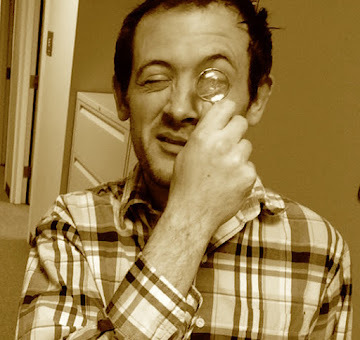 Joe Baumann is the author of four collections of short fiction, most recently
Where Can I Take You When There’s Nowhere to Go
, from BOA Editions, and the novels
I Know You’re Out There Somewhere
and
Lake, Drive
. His fiction and essays have appeared in Third Coast, Passages North, Phantom Drift, and many others. He possesses a PhD in English from the University of Louisiana-Lafayette. He was a 2019 Lambda Literary Fellow in Fiction. He can be reached at joebaumann.wordpress.com.
Joe Baumann is the author of four collections of short fiction, most recently
Where Can I Take You When There’s Nowhere to Go
, from BOA Editions, and the novels
I Know You’re Out There Somewhere
and
Lake, Drive
. His fiction and essays have appeared in Third Coast, Passages North, Phantom Drift, and many others. He possesses a PhD in English from the University of Louisiana-Lafayette. He was a 2019 Lambda Literary Fellow in Fiction. He can be reached at joebaumann.wordpress.com.1 - How did your first book change your life? How does your most recent work compare to your previous? How does it feel different?
Oh gosh--in so many ways. I think beyond anything else it felt validating and gave me a certain confidence in what I was doing, that after all of the no answers, I really was onto something that would, could, and did lead to a yes.
I think my recent work actually still emulates a lot of what I was up to in previous work thematically, in many ways, although the subjects have changed--as I've gotten older, so have my protagonists, and the kinds of "issues" they're facing have matured as I have.
2 - How did you come to fiction first, as opposed to, say, poetry or non-fiction?
Actually, I have a pretty weirdly circuitous path that led me to where I am now. When I started college two decades ago (eep!), I was convinced I would spend my life writing fiction and poetry. It became immediately clear I was not meant to do much of the latter. But I also struggled with fiction. I took a nonfiction course with a professor I really liked from taking my introductory course, and I was hooked--my senior project for my BA as well as my master's thesis were both in creative nonfiction, and it wasn't until I was doing my PhD and rolled the dice on taking my first fiction-focused course in about five years that I fell back in love with fiction, and I've largely stayed there (with dabblings into the other two) since.
3 - How long does it take to start any particular writing project? Does your writing initially come quickly, or is it a slow process? Do first drafts appear looking close to their final shape, or does your work come out of copious notes?
I am not much of a note-taker, or planner, except for the former when I get into revision. Otherwise, I usually start with some goofy premise and not much else and I spend a ton of time figuring out what that idea is about. So the start is usually pretty fast, and sometimes there's a dip as I wander about trying to figure things out.
4 - Where does a work of prose usually begin for you? Are you an author of short pieces that end up combining into a larger project, or are you working on a "book" from the very beginning?
If I'm working in short form (which is my favorite), I usually begin with an opening sentence that marinates for a little bit in my brain before I set it down on the page. Then I explore from there, and figure things out as I draft and try things out. Sometimes I'm working on a book conceptually--for example, I have a book of stories where each story reimagines one of the biblical plagues of Egypt, and I knew that I was trying to write one of each of those from the start. Other times, a collection simply emerges out of a larger pool of stories where I start to see thematic connections.
5 - Are public readings part of or counter to your creative process? Are you the sort of writer who enjoys doing readings?
I love doing readings, whether they're open mic nights on my campus or planned events. And I also love attending them--hearing other writers really helps get my creative work moving.
6 - Do you have any theoretical concerns behind your writing? What kinds of questions are you trying to answer with your work? What do you even think the current questions are?
The fundamental question that I'm always looking at, from some angle (as I think almost all writers are), is What does it mean to be a human being? I'm also deeply interested in the human desire for rationality and the complete irrationality of humanness, particularly as it relates to experiencing and responding to human emotions.
7 – What do you see the current role of the writer being in larger culture? Do they even have one? What do you think the role of the writer should be?
Oof! That's a big one. I think the work of a writer these days is to capture the cultural now--though that 'now' can be a different time (and different place) within the world of a particular story. We can't divorce ourselves entirely from the way the social, political, and historical landscape looks outside our writing nooks, and I think it's the writer's job to confront the tides of the world and make people think about them.
8 - Do you find the process of working with an outside editor difficult or essential (or both)?
Sometimes both. I love getting outside eyes to see what I'm too close to see, but I also don't want to have my vision stifled by someone else's vision for what my work "should" be, if that makes sense.
9 - What is the best piece of advice you've heard (not necessarily given to you directly)?
That a great ending is both inevitable and unexpected.
10 - How easy has it been for you to move between genres (short stories to the novel to young adult fiction)? What do you see as the appeal?
Pretty easy--I like working on several things at once, and I actually like when they are very different. I find it fun to switch modes, as they play against one another in interesting ways.
11 - What kind of writing routine do you tend to keep, or do you even have one? How does a typical day (for you) begin?
I almost exclusively write in the morning and then edit/revise when I can during the afternoons/evenings around my work schedule. I usually spend a short period on each piece I'm working on (never really usually generating more than a page or two per project in a given day). I've followed this for about ten years, and it's really worked for me.
12 - When your writing gets stalled, where do you turn or return for (for lack of a better word) inspiration?
The things I read. I read a ton, and if I'm stuck, I'll often read something that will unstick me.
13 - What fragrance reminds you of home?
Vanilla and apples--two of my favorite baking smells.
14 - David W. McFadden once said that books come from books, but are there any other forms that influence your work, whether nature, music, science or visual art?
TV has actually influenced me a lot. I loved Buffy the Vampire Slayer when I was young. I don't watch as much television as I used to, but the shows that drew me in years ago have stuck with me.
15 - What other writers or writings are important for your work, or simply your life outside of your work?
I'll follow Jennifer Egan, Adam Johnson, Ramona Ausubel, and Margaret Atwood to the ends of the earth. I read the magic realists from Latin American religiously (in translation).
16 - What would you like to do that you haven't yet done?
I've had some ideas for screen--television--but haven't ever really pulled the trigger.
17 - If you could pick any other occupation to attempt, what would it be? Or, alternately, what do you think you would have ended up doing had you not been a writer?
There was a time where I thought I'd be an eye doctor, and that would certainly still be neat (though quite the sea change).
18 - What made you write, as opposed to doing something else?
I don't really know, to be honest. I've always had an interest in the creative; I wrote my first 'story' (a ripoff of a cartoon I loved as a kid) when I was in 2nd grade. I think invention just appealed to me, and I never let that appeal go.
19 - What was the last great book you read? What was the last great film?
I just reread Hernan Diaz's Trust, which continues to fool and amaze me. I don't sit down to watch movies that often, but I recently rewatched Parasite and loved it as much as I did the first time.
20 - What are you currently working on?
Well, I just finished the garbage draft of a novel for NaNoWriMo, but I'm setting that aside for awhile to return to a surreal Southern campus novel about a young faculty member at a private college in Louisiana where strange things begin happening to administrators. The original draft was jammed with too much stuff, but after several months of letting it marinate I think I have a plan forward, so I'm excited to return to that project.
12 or 20 (second series) questions;



